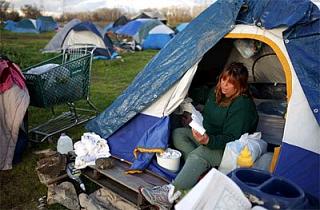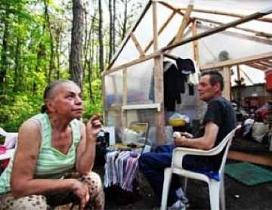America's Tent Shanty-towns run on Obama's Hope
"Hope", David Icke writes, is like riding a carousel horse; no matter how fast you go you never get closer to the one in front. The idea, however, is to persuade you to stay on the horse, despite the evitable disappointment, in the 'hope' that things will change. But they don't because the very system is designed to prevent it.
That's the way 'hope' is employed by the dastardly and devious - take the crap we are giving you now in the 'hope' that things will get better (but we know they won't). Barack Obama is a purveyor of 'hope' because his masters want the people to accept what they are given now in the hope that good times will come.
Just do what we demand, oops, sorry, Barack demands, and in return he'll inspire you to hope that it is all leading to the Promised Land. It isn't, but, by the time you realise that, it's too late.
What terrifies the manipulators is that people will abandon hope, as a future, sometime-never projection, and start to demand fairness, justice and freedom now. To avoid this nightmare they need to keep those desires as something to aspire to, not to actually have.
Thus, their man, Obama, sells 'hope' as a diversion technique, a holding position, to keep the masses from truly rebelling. We have no job, no food on the table and our home has been foreclosed, but at least we have 'hope'. Phew, thank goodness for that.
'I'm hungry, mum, can I have some hope, please?'
'I'm so sorry, darling, you can't have hope today, only tomorrow - hope is always tomorrow.'
'So will I eat tomorrow, mum?'
'We can hope so now, dear, but when we get to tomorrow, we can only hope it's the next day.'
On and on it goes. That's how 'hope' works. Or rather doesn't...
While Occupy Wall Street tents popped up all across the US, homeless people in greater numbers, have been forced to Occupy a camp in the woods -- some Americans have lived in tents for five years.
RT reports from New Jersey’s Tent City – and finds out why the homeless haven’t been joining the protests.
Tent cities of outrage have been popping up all across the US over the last months. Less visible to the public eye – and much quieter – is a Tent City of hopelessness – around for half a decade.
RT visited a village tucked away in the woods of New Jersey for the third time in about two years. The number of homeless turning to the camp for hospitality keeps growing. The population of Tent City turned out to have tripled compared to when it was first set up.
The place is home to about 70 homeless people who have nowhere else to go.
A third of the residents are women. They are ashamed to leave their tents in the presence of a camera.
The mood here has become increasingly politicized over the last year.
“The politicians and the government has not protected the American people, they've allowed outsourcing to run rampant, and it's benefiting companies, corporations are making more money than they've ever made before. The American worker is suffering at the expense of the agenda of the politicians,” said the community’s leader, Minister Steven Brigham.
46-year-old Angelo Villanueva – with a love for kung fu – lost everything in the recession and has never found a full-time job again.
“It seems to be a growing trend unfortunately. The politicians better take note and try to stop their bickering and do something to stop this, or slow it down, or make it better,” said the former brick layer.
Angelo calls himself a victim of the economy, and the woods – home. So does Charles Errickson, who has been homeless for the last two years. He used to play the harmonica, but this is no longer.
“There might be a certain degree of depression that might set in. Just the whole situation. Especially now, when it's getting cooler out and the days are shorter,” said Charles.
As if the sorrow of these people wasn't enough, officials have been trying to evict the homeless out of the camp.
“They try to force out the poor. I call it discrimination by design. For the sake of pushing the poor out and encouraging the wealthier, the people with money to move into your town,” said Minister Brigham.
Wealth inequality has been at the root of the anger for Occupy Wall Street protesters, but some of these homeless seem far from the demonstrators.
“I support them, but our situation is a lot different. We are homeless. We have nowhere to sleep. I am sure they have places to go when they are done their little rally,” said Angelo Villanueva.
“We've got our own Occupy movement in Lakewood. It's more of an occupy movement out of necessity,” said the community leader Steve Brigham.
Those who volunteer to help at the camp are not wealthy. Like Donald Daily, who is an artist on disability. He was also broke once. The neglect of the homeless is no surprise to him.
“Quite frankly, they don't want to know that these people are here – because they are ugly. They are faceless. They are nameless,” said Donald.
Many of the residents of Tent City used to blame themselves for their misfortune. But with 3.5 million Americans experiencing homelessness every year or over 700,000 people on any given night – their message for politicians has changed.
“Open your eyes. Open your eyes. All this help that we give out all over the world, we need help here,” said Tent City cook David Jones.
As night settles, help is far from the woods – all they have left are their roosters that live in their trees to keep them company, but each homeless resident faces a hard truth by himself.
Comments
There are 0 comments on this post















